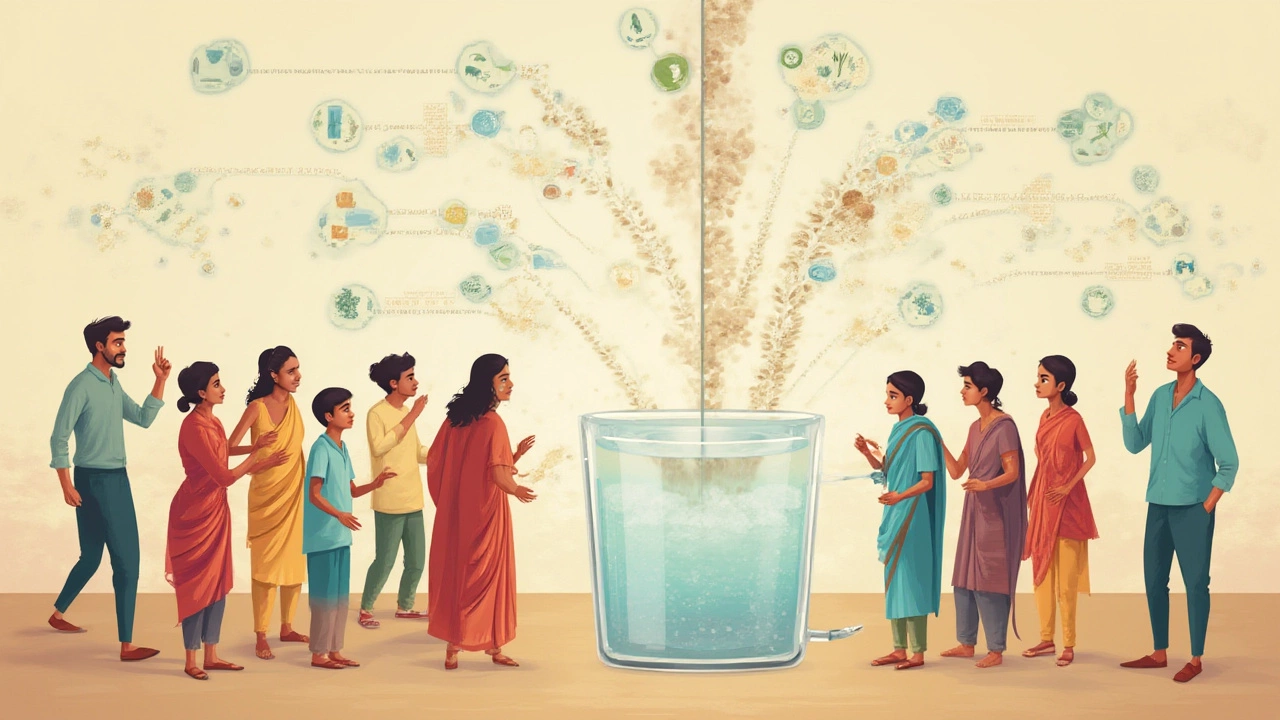It's easy to get swept up in wellness trends, but rice water for weight loss really sounds just a bit too simple, right? Generations in Asia have treasured rice water—not as a miracle drink, but as a comfort food, a traditional beauty remedy, and sometimes as a handy fix for an upset stomach. But can this humble drink actually trim your waistline? The internet is flooded with jaw-dropping before-and-after photos, wild DIY guides, and hopeful anecdotes promising that a daily glass of rice water will have your jeans fitting looser by next week. Is there any real science behind this, or are we all just falling for another slick diet myth?
What Is Rice Water—and Why Is Everyone Talking About It?
First things first—let’s clear up exactly what rice water is. It’s the leftover, starchy liquid you get after you either rinse or boil rice. In many Asian households, it’s nothing new. People drink it hot for breakfast, use it to treat mild digestive bugs, or even splash it on their skin and hair. Fast-forward to today, and suddenly, every TikTok health guru is raving about it as the next big weight loss drink.
The surge in rice water buzz has to do with its ancient reputation for gentle healing and the modern appeal of clean, simple foods. Some folks swear it’s the ultimate energy booster, thanks to the carbs and tiny traces of vitamins and minerals it leaches from the rice. Herbal medicine texts from China and South India talk about it soothing the gut, while Japanese beauty routines credit rice water with flawless skin. But here’s the thing—nobody really drank it for weight loss until very recently.
So, what’s actually inside this milky-looking liquid? In raw numbers, a cup of plain rice water (from rinsing) contains very few calories or nutrients. If you’ve boiled the rice and used that water, you might get a bit of B vitamins, tiny amounts of magnesium, and about 7-15 calories per cup—depending on how much rice you used and how much water you have left. It’s ultra-mild and certainly no meal replacement.
Here’s a quick breakdown of what’s found in regular rice water from white rice after boiling:
| Nutrient | Amount per cup |
|---|---|
| Calories | 12 kcal |
| Carbohydrates | 2.7 g |
| Protein | 0.2 g |
| Fat | 0 g |
| Magnesium | 2 mg |
| Vitamin B1 (Thiamine) | 0.01 mg |
| Potassium | 9 mg |
Not exactly a powerhouse, right? Most people probably burn more calories walking to the kitchen to make it. But before you write it off, there’s more going on beneath the surface.
Rice Water and Weight Loss: The Science and the Stories
Let’s talk about what science actually says. First, the honest answer: rice water doesn’t burn fat or boost the metabolism in any proven way. Unlike green tea (which actually has catechins that may help a bit), or even coffee, rice water lacks ingredients that directly rev up your calorie burn. If you see people claiming their body fat melted away just by adding rice water to their day, chances are, they also tweaked their whole diet or exercise routine at the same time.
Still, there’s a bit of logic in why some people might drop a few pounds. One explanation? Drinking rice water can make you feel fuller, just like a light soup or a glass of water before a meal. Dietary tricks that increase fullness often help people eat less at their next meal, and some folks use this to curb snacking. If you swap out a high-sugar, high-fat drink for a glass of rice water, you’re cutting overall calories—just in a roundabout way.
Skeptical? Fair enough. There’s not a single published clinical trial (as of mid-2024) showing that rice water alone leads to weight loss in real people. A 2018 research review out of South Korea found that people on traditional rice-based diets (with plenty of vegetables and low-fat sides) tended to be slimmer than those eating more processed foods, but the rice water itself wasn’t the hero. Some small studies in India and Japan suggest that rice water can soothe an upset stomach and help people stay hydrated—handy during illness, but not exactly headline news if you’re trying to slim down.
On social media, you’ll see dozens of videos of dieters who say rice water is their secret weapon—but look closer, and most also mention eating fewer snacks, cooking at home, walking more, or making other changes. Is rice water a magic bullet? Nope. Can it be a gentle, harmless part of a hunger-management plan? Possibly—especially if it replaces something much heavier or higher in sugar.
Experts who run actual weight loss clinics usually don’t put rice water on top of the “best foods for weight loss” list. They’ll point you (pretty sensibly) toward foods with more filling fiber and protein—like beans, lentils, and veggies. The low calorie count in rice water means it won’t derail your goals, but it won’t speed up your weight loss on its own, either.

How People Actually Use Rice Water in Diets
Forget the hype for a moment and let’s look at how people actually use rice water day-to-day. If you want to include it in your routine, there are a few ways to do it without falling for gimmicks:
- As a Breakfast Drink: In some Indian states, lightly salted rice water (kanji or congee) is sipped warm for breakfast. When paired with a small serving of lentils or a boiled egg, it can be a light and comforting way to start the day.
- Appetite Curbing: Try a glass of cooled rice water around 30 minutes before lunch or dinner—not as a replacement, but just to take the edge off. You might find you serve yourself a bit less food.
- Hydration Boost: During hot weather, unsalted, cooled rice water is a soothing, hydrating drink. Some folks add a squeeze of lime or a pinch of cumin just for flavor—totally optional.
- Digestive Issues: If you’re struggling with a mild bout of diarrhea, rice water is a classic home remedy for all ages in places like Sri Lanka, Bangladesh, and the Philippines. Its mild starch soothes the gut lining and replaces lost fluid. But ask your doctor if symptoms get serious!
Don’t confuse rice water with rice milk (which is made by blending and straining cooked rice—it’s much thicker, and has more calories). Also, the type of rice matters—brown rice may give you a touch more fiber and minerals, while white rice water is very bland and easy to digest.
Want to try making rice water at home? Here’s a dead-simple method:
- Rinse 1/2 cup uncooked white or brown rice thoroughly.
- Add 2 cups water and bring to a gentle boil.
- Simmer for 10–15 minutes, stirring now and then so nothing sticks.
- Strain off the liquid into a clean bowl; add a pinch of salt if you like.
- Let it cool before drinking, or sip it warm.
It keeps in the fridge for up to 2 days. Use it as a mild drink, not a substitute for meals or proper hydration. If you want a splash of flavor, squeeze in some fresh ginger or lemon, but don’t go overboard with sugar or honey—it kind of defeats the purpose if you’re trying to lose weight!
The Bottom Line: Is Rice Water Worth Adding to a Weight Loss Plan?
There’s something appealing about the ritual of making and sipping rice water—it’s simple, it connects you to tradition, and it doesn’t demand any wild or expensive ingredients. But the most important thing to remember is that rice water is not a shortcut to weight loss. If you click play on those viral videos and expect rice water to do miracles, you’ll probably be disappointed.
Here’s what actually works: eating more high-fiber foods, balancing your meals, moving your body, sleeping well, and being consistent. Drinking rice water as part of a balanced routine might help you snack less (especially if you swap out more calorie-dense drinks), and if you love the taste or the comfort, there’s no harm in enjoying it. Just watch for ready-made versions that load up on sweeteners or additives—they’ll sabotage your goals.
For anyone hoping to try rice water, remember:
- It won’t burn fat by itself—no drink does.
- If you love rice water, treat it as a light beverage, not a cure-all.
- Don’t rely on it for full nutrition. Pair it with healthy whole foods.
- If you have diabetes or blood sugar concerns, talk to your doctor before making rice water a daily part of your routine—even simple starch has an effect.
Weight loss is a marathon, not a sprint. If you find comfort in a mug of plain rice water, enjoy it. But real weight loss happens when you change how you eat, move, and think, not by hunting for a single magical drink. If you need something filling, try soups, dals, or a handful of nuts. Your body, your rules.
What’s your experience with rice water? Does it make you feel fuller, or is it just a soothing comfort drink for you? Sometimes, food is about so much more than what the latest hashtag claims.
